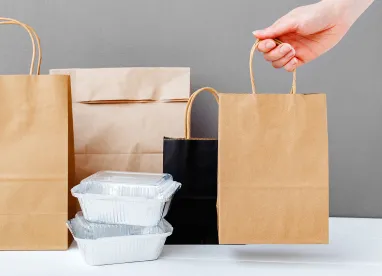Disputes between restaurants and third-party food delivery services—such as Grubhub and Uber Eats—have made headlines over recent years. This tension has only been compounded by the COVID-19 pandemic. 2020 was a particularly tough year for restaurants across the country and even tougher in cities like New York where rents are high and state-mandated business closures resulted in significant cuts to already narrow profit margins. However, the same has not been true for third-party food delivery services. In 2020, food delivery apps saw substantial increases in revenues. Uber Eats, for example, reported revenues of $2.51 billion in 2019; that number jumped to approximately $3.5 billion for the first nine months of 2020.
Although the media has reported extensively on growing discontent over the high fees that these food delivery services charge restaurants and consumers, there is another significant issue that has failed to garner as much attention. Specifically, restaurants have reported that third-party food delivery services have been listing restaurants on their online platforms without the restaurants’ permission. This practice has created problems for restaurants, which often have no knowledge that they are listed on the apps and are unable to control the content that these platforms provide to their users. Some platforms have posted outdated menus with incorrect pricing. Others have indicated erroneously that a restaurant was closed or that online ordering was unavailable even when the restaurant was open and accepting orders. This incorrect information often frustrates consumers, who tend to blame the restaurant for any misrepresentations.
These purported practices by food delivery services have given rise to litigation. One class action filed in federal court in Colorado alleges that Grubhub has engaged in a “nationwide false advertising campaign to steer patrons to its partner restaurants by falsely declaring that its competitors are closed or not accepting online orders when they are in fact open for business.” CO Craft, LLC v. Grubhub, Inc., (D. Colo. May 11, 2020). The putative class in that action is seeking, among other things, injunction relief and treble damages under the Lanham Act.
Similarly, on October 26, 2020, two restaurant owners filed a class action lawsuit against Grubhub in the US District Court for the Northern District of Illinois. In that case, the plaintiffs alleged that Grubhub added their restaurants to its platform without their permission and without disclosing this information to consumers. Complaint Lynn Scott, LLC v. Grubhub, Inc., (N.D. Ill. Oct. 26, 2020). Specifically, according to the plaintiffs, Grubhub increased its revenues by adding more than 150,000 unaffiliated restaurants to its inventory, all the while using the restaurants’ names and logos without permission and misleading consumers in violation of the Lanham Act.
State legislatures soon took notice and began responding to these practices. California passed the Fair Food Delivery Act of 2020, which prohibits food delivery platforms from taking orders from a restaurant without first obtaining an agreement with that restaurant. New York has followed suit. On January 6, 2021, the New York State Assembly introduced assembly bill A784, which requires a third-party food delivery service to obtain written authorization from a restaurant before listing that restaurant on its platform, taking orders for the restaurant, or delivering orders from it. If passed, the bill would also require these food delivery companies to remove restaurants from their platforms within five days of receiving a request to do so; otherwise, they will be fined $500 per day until the restaurant’s information is removed.
Although these practices by third-party food delivery services predate COVID-19, the pandemic has put these issues into sharper focus. With an uptick in lawsuits being filed across the country coupled with the current popularity of these services, one can expect to see more states proposing legislation to address and to regulate these practices, particularly in large urban markets.
Anna Baitchenko also contributed to this article.




 />i
/>i
